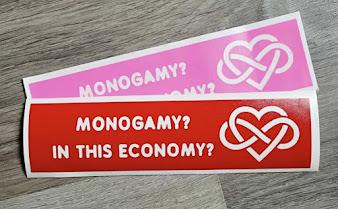Compersion, the polyam future, and some necessary dashes of cold water

|
|
Getty |
...Openness towards many kinds of non-traditional relationships has gained visibility, too. Ethical non-monogamy has been all over TikTok, often in the form of polyamorous relationships, in which more than two committed romantic and sexual partners cohabit. Then there are open relationships, which can look like anything from partners who hook up with other couples together, to those who have separate relationships with others outside their primary partnership. There are also poly people who prefer to live solo, embracing a ‘solo polyamorous’ lifestyle, through which they live alone but engage in multiple, committed relationships. Others to choose to cohabit with platonic partners, forming lasting relationships and even buying homes and planning futures with close friends rather than lovers.
By Lexi Inks...Generally, the community defines the concept as feeling happy that your partner is happy—even if with their other partners.
Obviously, no single solution can be a one-size-fix-all for every relationship, but compersion has become a widely accepted pathway to peace for people in relationships that fall under the non-monogamy umbrella....“Compersion is fairly new on the scene, so it might take some practice to find it in yourself, but let me assure you, it is in there somewhere,” says Dossie Easton, marriage and family therapist and co-author of The Ethical Slut. “A lot of us experience jealousy that we don't want, so compersion can offer a pathway to a better place.”...Confronting the jealousy you or your partner might be feeling in your relationship can be a super emotionally-charged process, and might not end well if it’s not handled with care. With compersion, polyamorous people especially have found a way to simplify that process and help those who feel jealous take ownership of their own emotions._____________________________Related Stories_____________________________...Some non-monogamous folks consider compersion to be the antithesis of jealousy... “but I’m not a fan of that because you can definitely feel both at the same time,” explains certified sex educator Angel Kalafatis-Russell, MS, CSE. ......Easton recommends trying to foster good relationships with your metamours as a way to enhance feelings of compersion.“That may be inviting someone out for a hike or a game of pool, or helping them move, or making chicken soup if they get sick. The point is to nurture a friendship that feels like family to all its members, while we acknowledge that we have a responsibility to support positive connections with our lovers' lovers,” she explains. Nurturing a positive connection with your metamours can help ease feelings of jealousy or insecurity in each of you.
And even though you’re polyamorous, you don’t necessarily have to feel compersion all the time, [Michelle] Hy says. In fact, it’s totally possible to have a healthy and well-functioning poly dynamic without it. ...What if I’m in a monogamous relationship?...It’s okay—and healthy, in fact—for your partner to find fulfillment in [things] other than you.“...You might want to think about the pleasure you feel witnessing someone you love enjoying a particularly wonderful flavor of ice cream, or a transcendent chocolate truffle. That might make it easier to notice your own feelings when you witness a lover's delight in something that isn't about you,” Easton shares. ... Putting the pressure on yourself or your S.O. to be each other’s everything is unfair, and can cause codependent or possessive behaviors....

Getty
By Mark Travers...Research by [NYU professor Dr. Zhana] Vrangalova... makes it clear that non-monogamy is not a fringe desire.... But is the desire to be sexually active outside of your primary relationship amoral? A better question, according to Vrangalova, is why these desires feel so natural.Vrangalova explains that while the need for security and companionship is present in every human being, there is another desire in all of us ... for novelty, exploration, and experience-seeking. According to her, non-monogamy is a manifestation of this desire.“There are evolutionary arguments to be made for both needs,” says Vrangalova. “Long-term relationships fill the need of security, trust, and stability, which is the most important basic need. However, that need is separate from experience-seeking. The reality is that humans have both of these needs.”Our culture, Vrangalova warns, is currently too intolerant of what she calls ‘negotiated non-monogamy’ — which, for some couples, is a way to satisfy both needs.“To start, we need to change the default assumption that we’re going to fall in love and never have outside sexual desires again,” says Vrangalova....Here are three pieces of advice she gives for couples who want to dabble in non-monogamy:– Talk about your sexual fantasies. The starting point for any couple should be to have an open and honest conversation about the things they desire sexually. Shame can chip away at the strongest of bonds.– Go slow with non-monogamy. There are degrees of openness in any open relationship. ...
– Put effort into your sex life. We need to invest energy into our sexual satisfaction. ... “It’s easier to maintain sexual desire than bring it back from the dead,” says Vranglova.“We are entering a time of greater honesty. It’s just a matter of time before the facade of monogamy falls. But don’t think of it as the end of long-term relationships.”
Approaching it with curiosity can really transform the experience into a journey of self-discovery and growth.Interview with Ana Kirova, by Lexi InksOne form of ethical non-monogamy (ENM) is polyamory. ... “We have definitely witnessed increasing understanding and acceptance of ethical non-monogamy, and conversations surrounding the topic are increasingly common and continue to grow,” [Feeld CEO Ana] Kirova tells Bustle. ...Bustle: If someone is new to non-monogamy/polyamory, how do you suggest they approach that topic with potential new partners?Kirova: I would start by reading about different relationship structures to build some understanding and confidence on the topic. ... Using language that reflects your experience is always helpful: ‘I would like to’, ‘I feel,’ etc. are great ways to begin sharing your experience. Last but not least, be open-minded and curious about the conversations you are opening, and listen to your partner as well.What are some examples of ways to open a conversation about polyamory when you're on a date with someone who might not be polyamorous?...I can’t stress enough the importance of open and honest communication. Be clear when stating your desires and boundaries, and meet their questions with patience and honesty. ... Explain your position, why polyamory works for you, and how you came to this place....Above all, just as you expect to be met with patience and minimal judgment, honor your date by reacting to their feedback and concerns in the same way. ...What advice would you give to someone who is new to polyamory and enters a pre-existing polycule via a new relationship?It might seem like an obvious thing, but be curious, communicate a lot, and check in with yourself and your partners. ... Approaching a pre-existing polycule can be a wonderful journey of self-discovery. ...

Valiant Made / Unsplash
By Mona Lazar...First, let’s decide what polyamory is not:It’s not a space where everybody has sex with everybody else. ... It’s not a space where it’s ok to sleep with others without consent from your other partners. ... It’s not for commitment-phobes; you need to commit to a whole array of people.Then, let’s see why most of the time it doesn’t work:1. It’s used as a front for something else.Let’s face it, the concept of polyamory is highly used and abused. A lot of people out there use it as nothing more than a label that says ‘I’m this cool modern guy who wants to sleep with everybody around and if you’re not ok with that, you’re not cool.”...Here’s what is uncool: pretending you’re the cool girl or the cool wife who is ok with any sort of sexual activity just to please your partner.2. It’s not for introverts. [As an introvert, I disagree –ed.]The problem is in the name. Poly = several/ many/ much/ multi.As an introvert, you hardly have enough mental space and energy for one more, let alone 7. Or 27.Poly comes with a lot of meetings, a lot of schedules, a lot of things to do together with the whole extended family. Various people keep coming and going, there are strangers you keep meeting and friends who leave. Or they don’t leave, they stay as adjacent to the polycule, without being romantically or sexually involved with anyone anymore.The bottom line, the group gets bigger and bigger. ...Which is no big deal for an extrovert. ...3. Unless it’s double-sided, it can be abusive.It doesn’t happen in every case, but it does happen. A lot.There are some [good] one-sided poly relationships out there. This means that one side of the couple is poly and the other is monogamous and they’re both ok with that.More often than not, however, you have the monogamous side who fell hard for a poly [person] and is accepting him for who he is but doesn’t have their own needs met. ...Also, things get more severe and downright abusive when the poly partner actively pushes polyamory as a way to coerce the other party into various religious or cult-like situations. Yes, it happens.4. It’s a lot more work than anybody imagines.If you don’t want extra work when you come back from work, poly is just not for you. Relationships are difficult even one-to-one. ...5. Some poly concepts are not psychologically correct.For example, the concept of egalitarian polyamory (not having a main partner, but all partners being equal) is humanly unattainable. The brain doesn’t work that way.... You prefer one of them. And it’s only natural.It’s also not a big happy family. It’s a family, and all families come with a lot of work to make them functional and happy.
Conclusion:Can it work out for some? Absolutely.One of my poly friends is part of a polycule that takes pride in mutual respect, common values, and a belief that love shouldn’t be limited by anything else but consent.They make it work, but she agrees it takes a lot of work.For her, it’s worth it because she just couldn’t imagine life any other way. She is poly down to her bones.Can it work for everyone who takes a whack at it? Absolutely not. It works for very few. Because it’s logistically and psychologically difficult even when you are poly down to your bones.But... just because it’s difficult doesn’t mean it’s unattainable. And if it fails, there’s always a place for you with most.
By Jera Brown...In polyamorous circles, there can be an air of superiority over those who choose monogamy. A belief that polyamorous folks are somehow more enlightened for having escaped the trap of monogamy.But this misses the point [of the poly-awareness movement], which is that how you do relationships should be a choice. To me, understanding that you have a choice is where any sort of “relationship enlightenment” starts.So anyway, polyamory is great. But is it right for you?Four Reasons Polyamory Might Not Be Right For You:1. You’re Just Trying To Save a Failing RelationshipIn my experience, this is one of the most common reasons why couples open up their relationship. And it’s not a good idea.... [Exception:] In the past, I’ve encouraged folks in relationships with mismatched sex drives to consider non-monogamy. ... So what’s the difference? Communication.2. You’re Not Great at Articulating Boundaries/Needs And You’re Not Going to Start Now...3. You’re Not Willing to Sit With Jealousy4. You’re Primarily In it for the Sex5. You’re Feeling Pressured Into ItIf you’re convinced that polyamory might not be for you, here are some alternatives to consider.1. Swinging...2. Monogamish...3. Relationship Anarchy...4. Deliberate Monogamy... [also called "conscious monogamy," as opposed to "default monogamy."]5. Ambiamory... It’s a relationship structure or identity which means people can find satisfaction in either monogamy or non-monogamy. And it’s basically a nod to the reality that everything in life is fluid. ...
Yes, even if you think you're on the same page about what constitutes cheating in your monogamous relationship.

Monogamy agreement in formation. (InStyle / Getty)
By Dr. Jenn Mann...Typically, couples who practice non-monogamy outline in detail what non-monogamous activities are considered OK in the coupledom. One of the strengths of these types of relationships is a tendency to talk through all of the possibilities of where things could go wrong and very clearly outline the boundaries. This is where monogamous couples have a lot to learn from their non-monogamous counterparts.Now, more and more monogamous couples in long-term relationships or marriages are catching on, and choosing to create monogamy agreements. These agreements outline, in writing, how monogamy is defined in your particular relationship. By outlining different nuances and categories where things could go wrong, they are attempting to preemptively avoid cheating (however they define it) and keep the lines of communication open.... Putting your monogamous agreement in writing requires the two of you to have deep discussions, define what is monogamy to each of you, and get clarity on how the two of you will define it in your relationship. This type of high-level communication can help avoid problems in the future and strengthen the bond between the two of you....Not to mention, it could allow the two of you to enjoy certain behaviors that you might not have shared together without the clarity. For example, one couple I know is sexually exclusive but allow one another to flirt via text or messaging.....In order to create a monogamy agreement, you need to sit down with your partner and have some serious conversations. ... What is most important about monogamy to each of you? Get specific about what exactly constitutes cheating and what might be grounds for a breakup?....Here are some categories to consider....Sexual contact....Social media...Flirting...Emotional intimacy...Sexting...Pornography...Sex workers...Masturbation....
...That night over wine and sushi in a booth at one of our favorite restaurants, I asked my boyfriend for an open relationship—and he agreed!…Two weeks later, we were broken up. And I was…actually kind of relieved, TBH. I was forced to confront an uncomfortable truth, one I knew I’d been hiding from for a while: I didn’t actually want an open relationship. What I wanted was to be single....As consensual non-monogamy becomes increasingly visible, I think there’s a growing tendency to view open relationships as a panacea for any and all relationship problems, particularly when those problems involve a desire for sex outside of said relationships. ......“Opening up to other sexual partners is a good alternative for couples who are relatively happy in their relationship overall, and the major reason for dissatisfaction comes from the monogamous nature of the relationship itself,” says [Dr. Zhana] Vrangalova.That said, open relationships are very much not the free ticket to the Have Your Cake and Eat It Too buffet we sometimes fancy them. For one thing, the emotional energy and communication that goes into maintaining an open relationship is no joke. This means they need a rock-solid foundation to actually work. Introducing non-monogamy to a failing relationship in an attempt to salvage it is, frankly, unlikely to go well. Think of it as the modern version of having a baby to save your marriage. It may be a temporary distraction, but it’s probably going to do more harm than good in the long run....As I learned firsthand, however, it’s harder than it sounds to tell whether opening up is actually a healthy move that will strengthen your relationship, or a Band-Aid you’re slapping over issues you’d simply rather ignore. ...
By Suzannah Weiss
A polycule is a group of polyamorous people who join to create a family of sorts.

Igor Alecsander / Getty ...People in a polycule may all be dating one another, or some members of a polycule may only date one person within it. ... Some members of polycules will have a primary partner, which may be a live-in partner, a spouse, or someone they spend most of their time with. Other polycules may be less hierarchical, where all people are equally intertwined with one another and may even all live together....“Polycules may function like a family, where everyone gets together and enjoys each other's company, but not necessarily on a romantic level,” explains Rhiannon John, a sexologist at BedBible. “But other polycules may have less to do with each other, only meeting on certain occasions, like the birthday of a common partner.”The one thing all polycules have in common, though, is that they sign on to the arrangement and respect one another’s boundaries. “A key aspect to practicing nonmonogamy is that all participants are aware of the relationships formed, and open discussion occurs to ensure everyone agrees to the terms of [their] relationships,” says Williams.How do rules and boundaries work within polycules?...
How do I have a healthy polycule?
...“It's important to form some infrastructure for the members to check in with one another on a proactive basis,” DeRosa says. This may mean blocking out time each week for everyone to talk....Many of the discussions that [Jon] Simons has to maintain healthy relationships with his partners, especially those he lives with, involve humdrum things like schedules, chores, and finances. “Not having these conversations can build up resentment,” he says. ...Why do people form polycules?
...For some people, polycules provide a community that allows them to connect with the partners of someone they already know and love. “I like that everyone gets along, so then, I can spend time with multiple partners at once,” says [Leanne] Yau. “My partners can bond over their mutual appreciation of me.”For Sallie, being in a polycule means more love and support, as well as sexual variety. “I can experience quite poor mental health, and having more people to support me helps enormously,” she says. “I don’t feel like I’m such a burden, and my partners can feel less isolated.”Simons also enjoys having a support network of different people who meet different needs. ...“I’m a big proponent of chosen family, and polyamory is definitely one of the ways I achieve that.”
They will have 12 jobs before they are 40 and then change careers yet again, live in five different cities by the time they turn 60 and still need to start a new job when they “retire.”... The majority of millennials and zoomers will almost certainly have lives of constant change. Why should their relationships be the only thing that takes one form and remains that way for the rest of their lives? Choosing a relationship style that flexes with their changing circumstances makes a lot of sense....
SquidlyCo
● Movie and TV list: Can somebody please make a really good one?? More than two dozen movies and TV shows with poly themes are posted by Reddit user u/halvoid, who briefly rates the 14 they've watched and asks readers to help fill out the list.
● Last year Ken Haslam endowed a permanent annual $5,000 Relationship Diversity Research Fellowship through the Kinsey Institute for grad students and other researchers studying ethical non-monogamy. Last year's award went to Dr. Amy Moors of Chapman University. This year's recipient was just announced: Dr. Rhonda Balzarini of Texas State University. Press release.
“This struggle will define in what world our children and grandchildren will live, and then their children and grandchildren. It will define whether it will be a democracy for Ukrainians and for Americans.”

|
|
The Russian family-cartoon series Masyanya turned dissident. Watch. The cartoonist has fled. Update: a brilliant sequel of turnabout, with a coda of empathy in wartime. |
Here was a country with a tragic history that had at last begun to build, with great effort, a better society. What made Ukraine different from any other country I had ever seen—certainly from my own—was its spirit of constant self-improvement, which included frank self-criticism. For example, there’s no cult of Volodymyr Zelensky in Ukraine—a number of Ukrainians told me that he had made mistakes, that they’d vote against him after the war was won. Maxim Prykupenko, a hospital director in Lviv, called Ukraine “a free country aspiring to be better all the time.” The Russians, he added, “are destroying a beautiful country for no logical reason to do it. Maybe they are destroying us just because we have a better life.”

|
|
"Defenders of Bakhmut," where Zelensky spoke to
soldiers at the front line a day before he spoke to
Congress. They gave him a battle flag that they
signed, which he presented to Nancy Pelosi. Art
by Natasha Le in Mikolaiv, who reinterprets
traditional guardian angels as riot grrls for an
upcoming generation. |
Labels: #compersion, #MonogamyAgreements, #Polyamory, #PolyamoryNews, #polycule, compersion, critics of poly








